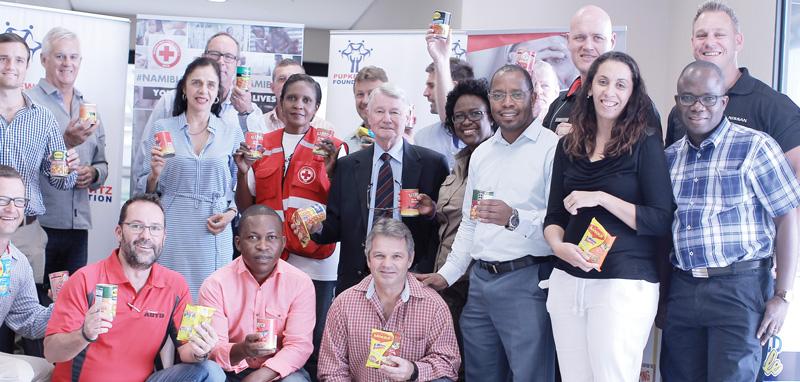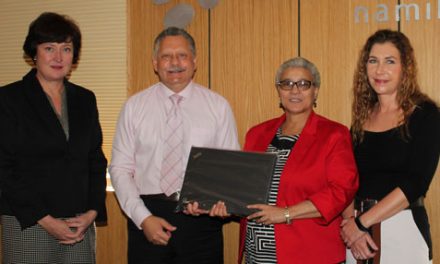
Schlip community in need of tarred roads

The government officials at Schlip from left to right: Councilor of Rehoboth Rural Hon.Riaan Mcnab, Chairperson of Hardap Regional Council, Hon. Jeremiah van Neel, Hon. Deputy Prime Minister and Minister of International Relations and Cooperation, Netumbo Nandi-Ndaitwah, Hardap Governor Hon. Esme Isaack, Minister of Information and Communication Technology, Hon. Tjekero Tweya, Minister of Poverty Eradication and Social Welfare, Hon. Bishop Zephani Kameeta, Minister of Mines and Energy, Hon. Obeth Kandjoze and Minister of Land Reform, Hon. Utoni Nujoma. (Photograph by Hilmah Hashange).
One such settlement is Schlip, a small township located in the Rehoboth Rural constituency in the Hardap Region. Schlip, which is over 300 square kilometres has a population of about 1500 people and is considered an ‘island’ surrounded by private land.
“We in the rural areas of Rehoboth and Mariental are in dire need of good road infrastructure which will attract more investors to the settlements. No tarred roads exist in our constituencies, only gravel roads. The creation of tarred roads will win the war of poverty in our constituencies,” said Rehoboth Rural constituency councillor, Riaan McNab.
“The construction of tarred roads will boost the tourism sector and investors will be able to transport goods and services in safe conditions,” he added.
Speaking during a recent familiarization visit by Hon. Deputy Prime Minister and Minister of International Relations and Cooperation, Netumbo Nandi-Ndaitwah, Councillor Mcnab described the visit as a sign of prosperity. “We have hope that the social economic conditions of our people will change forever,” he said.
The Deputy Prime Minister was accompanied by the Hardap Region Governor, Hon. Esme Isaack and an entourage of dignitaries which included Minister of Land Reform and his Deputy Minister, Minister of Poverty Eradication and Social Welfare, Minister of Information and Communication Technology, Minister of Mines and Energy, Deputy Minister of Sport, Youth and National Service as well as representatives from the Ministry of Health and Social Services and Ministry of education, Arts and Culture.
Addressing the gathering in Schlip, Nandi-Ndaitwah said although the purpose of the familiarization visit was to thank the manner in which the people of the country conducted themselves during the 2014 Presidential and National elections, the hard work now starts, adding that the president made it clear that the stance on poverty eradication requires commitment and working together.
“The international community has been using the term ‘poverty reduction’ which in my opinion does not tell me anything, we cannot say poverty must be reduced, no one should remain in poverty, we can eradicate poverty-each and every one of us have a role to play. We will overcome poverty if we all just believe in everything we do towards eradicating poverty,” the deputy prime minister said. She added that the Ministry of Poverty Eradication was created to supervise all efforts from government and stakeholders as a whole, saying that poverty cannot be eradicated by one ministry alone.
“No one is excluded in the fight for poverty eradication, the message of the President is for each and every one of us to play a role in poverty eradication,” she said. Addressing the issue of food security, Nandi-Ndaitwah said a decision was taken at the last SADC meeting that proposed that at least 25% of Africa’s natural resources should not leave the continent unprocessed, adding that the continent is the net importer of raw material.
“Climate change is threatening agricultural production in many countries, Namibia included. 500,000 peoplee in the country will need to be fed because of the current drought,” she said.
Nandi-Ndaitwah added that because of poor rainfall this year, the Green Schemes in the country could not produce sufficient food to feed those affected by drought.
She said that the fight to eradicate poverty requires other alternative ways of putting bread on the table. One such example is boosting the tourism industry, which Nandi-Ndaitwah said is not easy to maintain. She urged the community to think out of the box and pay special attention to service delivery if they want to boost their economy.










































